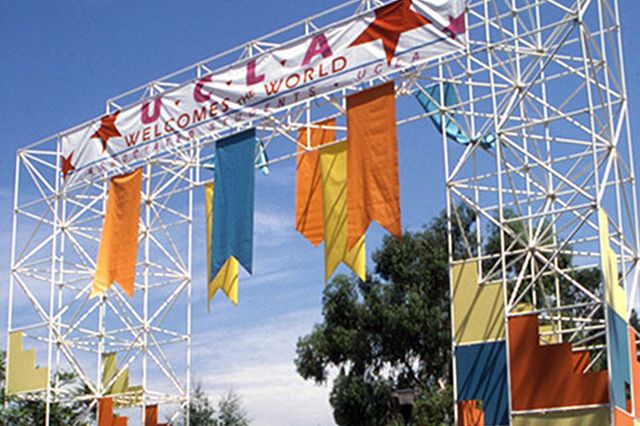1984: Incoming Freshmen’s Computer Knowledge the Year Macintosh Computers Were Born

This was the year made infamous by the George Orwell dystopian novel Nineteen Eighty-Four (published in 1949). It was also an Olympic year in which UCLA took part in the Los Angeles hosting of the Summer Olympics. The 1984 Summer Olympics were not only the first privately financed Games ever (raising a $225 million surplus) but were boycotted by Russia and 13 Soviet allies in retaliation for the U.S. boycott of the 1980 Moscow Games. UCLA athletes won 37 medals. In non-Olympic news, Ronald Reagan was re-elected President. Top-selling album releases included Bruce Springsteen’s Born in the U.S.A. (the title track of which was famously misunderstood by the Reagan campaign, much to Springsteen’s displeasure), Prince’s Purple Rain, Michael Jackson’s Thriller (for the second consecutive year) and the soundtrack to Footloose. U2 and R.E.M. also released albums; punk and alternative releases included those from Nick Cave and the Bad Seeds, Hüsker Dü, and Black Flag.
And, in the world of science and technology, not only did the U.S. Supreme Court rule that taping television shows on video cassette recorders for home viewing did not violate copyright law, but Apple introduced the first Macintosh computer. Notably, Drexel University (Philadelphia, PA) was the first member of the Apple University Consortium to require all entering freshmen to purchase Macs. So how interested in studying computers and technology were the incoming college freshmen of 1984, three years after the first personal computer was introduced and the year the Mac was born?
The Freshman Survey asked a number of questions measuring entering students’ interest in and prior experience with science and technology, some of which were computer-specific and some of which were more general. Specific questions about computers asked incoming freshmen about their having written a computer program or taken a computer-assisted course in the past year as well as how many years they had studied computer science in high school.
Overall, 27.7% of respondents had “frequently” written a computer program in the past year, 28.3% had “occasionally” done so, and 44% responded “not at all.” When examined by gender, 32% of male students and 23.7% of female students had “frequently” written a computer program in the past year; 31.6% of male students and 25.4% of female students had “occasionally” done so; 36.4% of male students and 50.9% of female students responded “not at all.” The gender gap is most prominent in the category of “not at all,” with a 14.5 percentage point difference between female and male students.
The majority of incoming freshmen (58%) had never taken a computer-assisted course in high school; 22.1% had done so “occasionally,” and 19.9% had done so “frequently.” When asked the number of years they had studied computer science in high school, 42.6% reported not having studied it at all; 26.8% reported having studied it for one year; 23.6% reported having studied it for half a year. Only 5.6% reported having studied computer science for two years; 1% had studied it for three years.
This seems to have been reflected in entering freshmen’s opinions regarding their probable college majors and careers. At the time, the answer options offered to respondents related to computers fell into either “computer science” or “data processing or computer programming.” Only 3% of respondents indicated their probable major would be “computer science”; 1.5% of respondents indicated their probable major would be “data processing or computer programming.” Of the probable computer science majors, 61.3% were male and 38.7% female; of the probable data processing or computer programming majors, 62.8% were male and 37.2% female. When looking at students’ projected careers, only 4.6% of respondents planned to be computer programmers or analysts.
In a testament to how times have changed both for CIRP’s assessment of incoming freshmen’s experience and with and interest in studying computers, 31 years after these entering freshmen were surveyed, Apple has launched a watch housing computer apps and 79.2% of incoming freshmen in 2013 rated their computer skills either “average” or “above average.” But back in 1984, these technological leaps had yet to be made. Video cassette recorders, after all, were still the big thing.
Did you know?: 71.6% of incoming college freshmen in 1984 reported that in the past year, they had not overslept and missed a class or an appointment.
57.1% of incoming college freshmen in 1984 thought there was either “some” or a “very good chance” that they would change their career choice.
